牛津译林版(2019)必修 第三册Unit 2 Natural Disasters Reading 课件 (共61张PPT,内镶嵌音频素材)
文档属性
| 名称 | 牛津译林版(2019)必修 第三册Unit 2 Natural Disasters Reading 课件 (共61张PPT,内镶嵌音频素材) |

|
|
| 格式 | pptx | ||
| 文件大小 | 19.5MB | ||
| 资源类型 | 教案 | ||
| 版本资源 | 牛津译林版(2019) | ||
| 科目 | 英语 | ||
| 更新时间 | 2023-06-06 07:42:54 | ||
图片预览

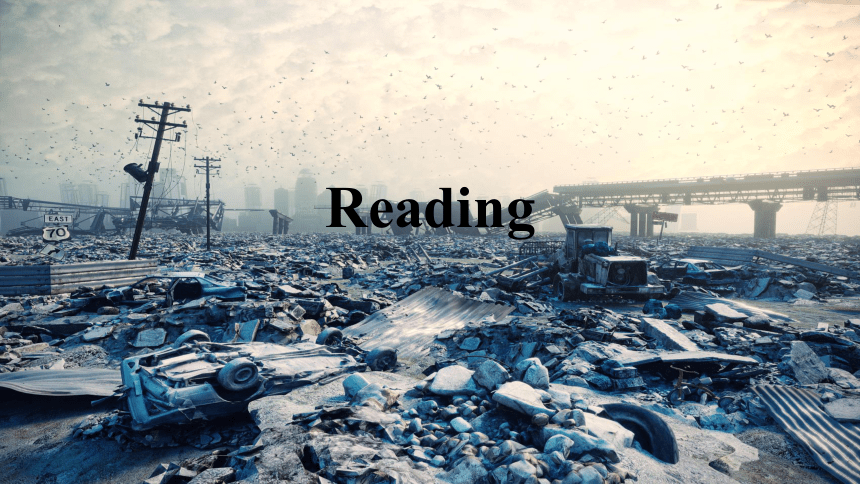

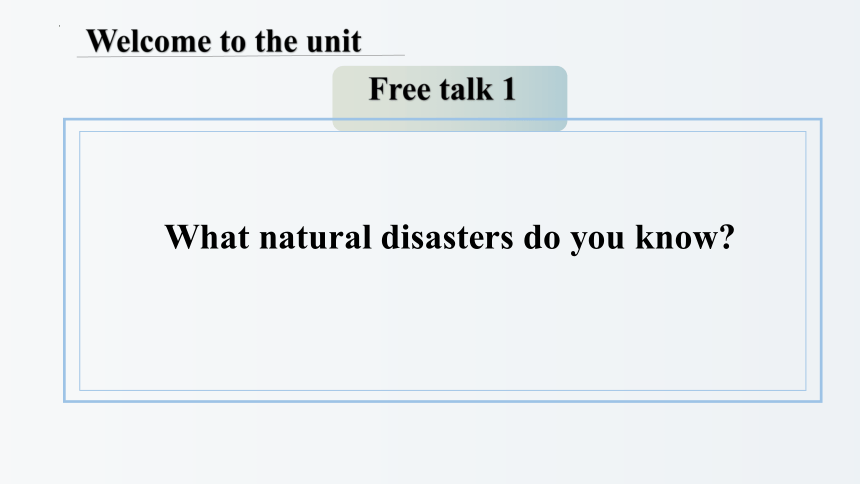
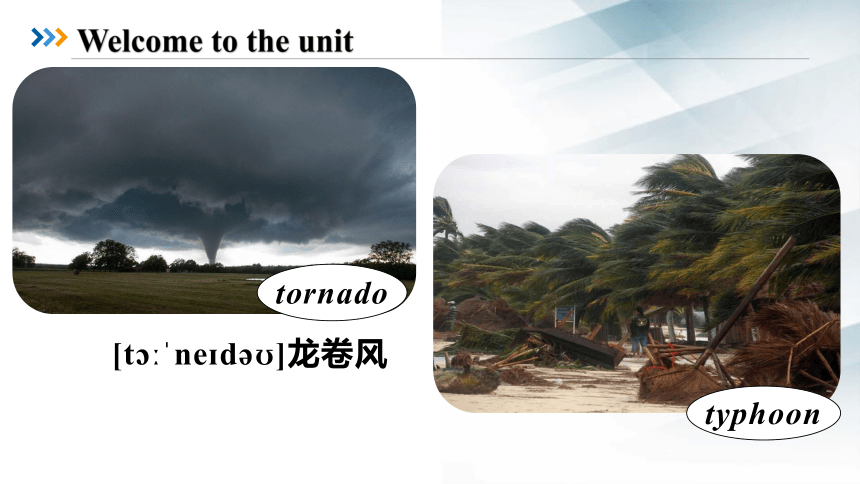
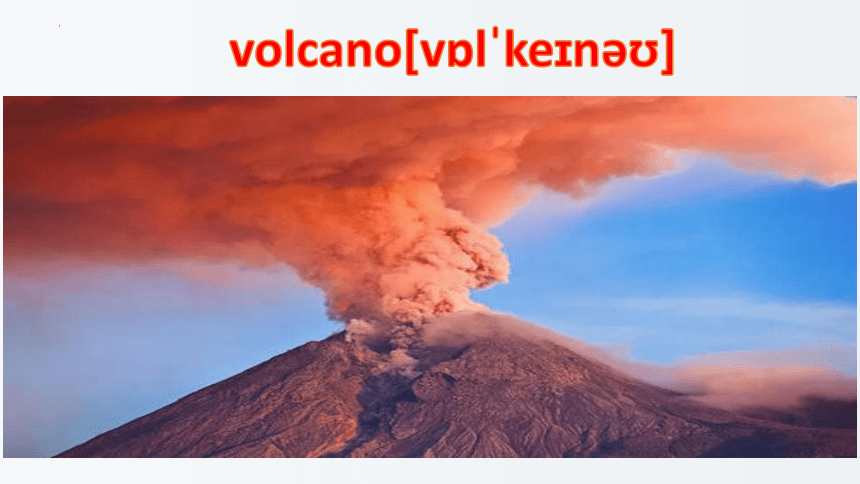
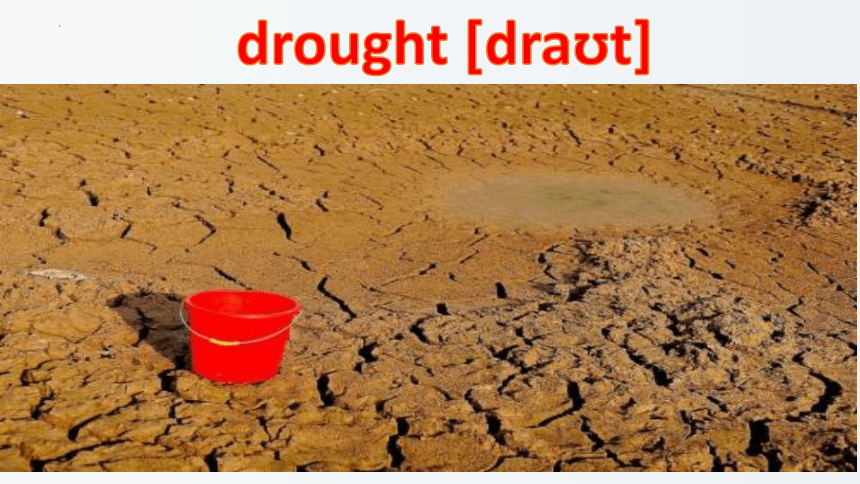
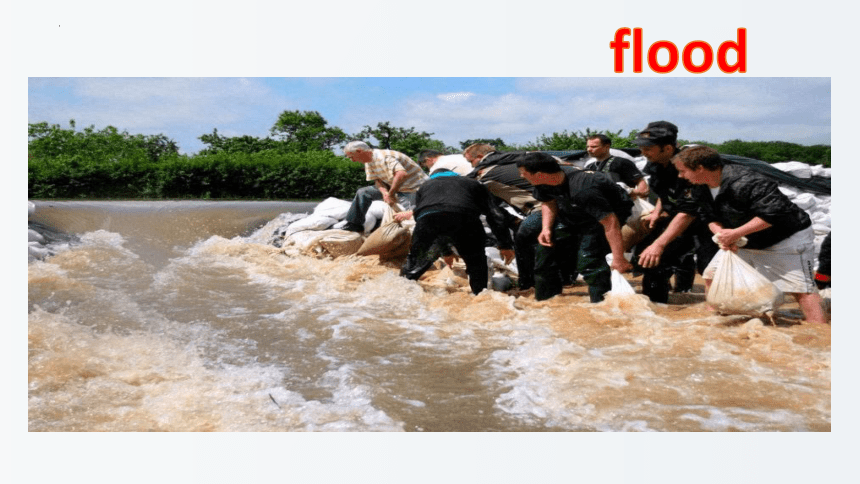
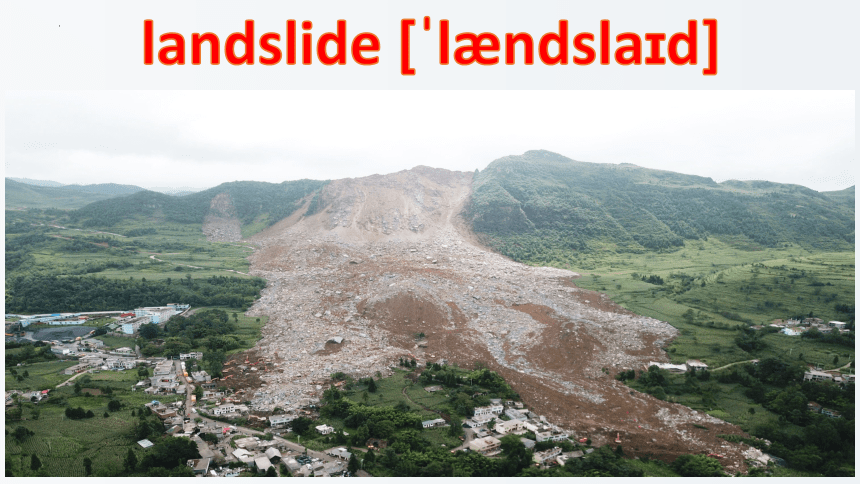
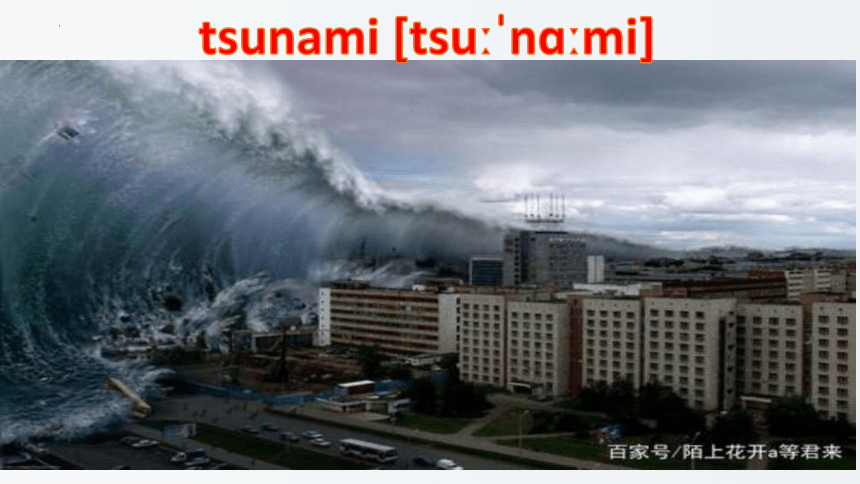
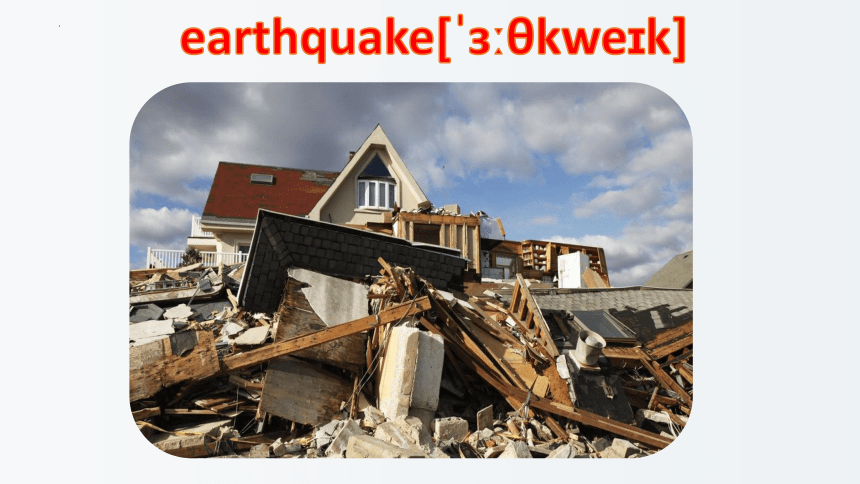
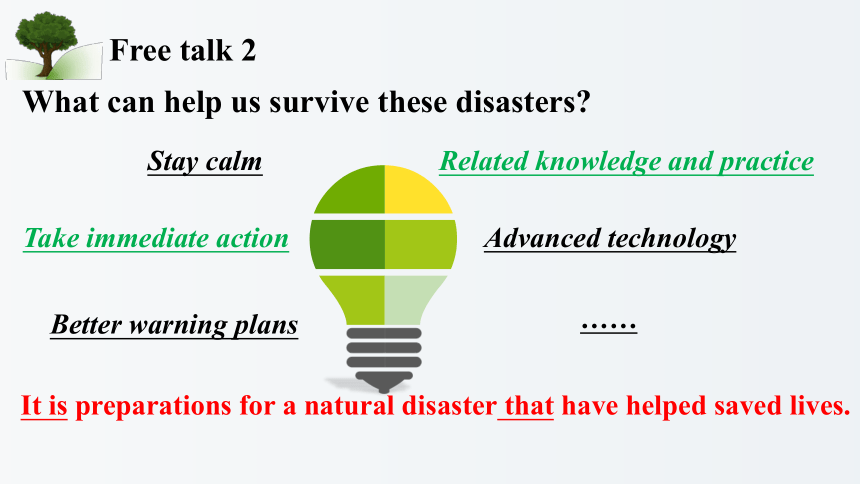
文档简介
(共61张PPT)
新牛津译林版高中英语必修三Unit 2 Natural Disasters
Reading
Reading
Nature is kind of a loving mother, but also a butcher in cold blood.
(大自然是慈爱的母亲, 也是冷血的屠夫 )
——Victor Hugo
Welcome to the unit
Free talk 1
What natural disasters do you know
Welcome to the unit
tornado
typhoon
[t ne d ]龙卷风
Welcome to the unit
volcano[v l ke n ]
drought [dra t]
flood
landslide [ l ndsla d]
tsunami [tsu nɑ mi]
earthquake[ θkwe k]
Free talk 2
What can help us survive these disasters
Take immediate action
Stay calm
……
Related knowledge and practice
It is preparations for a natural disaster that have helped saved lives.
Better warning plans
Advanced technology
1. What are the elements of a news report
The title, the lead, the body and the tail.
2. What kind of information does the lead mainly cover
The most basic information: where, when, who, what, why and how.
Pre-reading
Inverted pyramid structure (倒金字塔)
The tail
The lead
The body
the most important information
detailed information
background or supporting information
The Lead
The Body
The Tail
Fast-reading
The Lead
The Body
The lead Para. 1: FALMONT—On __________(when), _____________________________(who) at ________________________(where)__________(what) an earthquake that hit the county at 2:27 p.m.
The body Paras.2-3: The _________ of escaping successfully from the earthquake.
The tail Para. 4: The ________ for their calmness in the earthquake.
at Falmont Primary School
process
reason
Report1 Fill in the table
17 March
476 students and 36 teachers
escaped
News report 1
When (1) _________
Where Falmont Primary School
What Students and teachers at a primary school
(2) ___________________________________.
How They reacted correctly and quickly when the earthquake hit.
Why (3) __________________________________________
____________________________________.
17 March
escaped an earthquake
They practised safety procedures that taught students and teachers how to protect themselves
Fast-reading
Q: How many deaths and injuries did the earthquake cause in Falmont P18 A2
para.1
It caused 7 deaths and over 200 injuries.
Careful-reading
Report 1 (para.2-3)
The process of escaping successfully from the earthquake.
In what order does the reporter tells the story
In the order of time
was teaching when the floor…L5
At the same time…L7
the moment the shaking stopped L12
within one minute and twenty seconds
soon
after a roll call confirmed
Careful-reading
Who What did they do Why
Alice Brown ● 1.__________ the classroom door ●3.___________to her students to exit in an orderly line4. _________ their heads with hands ● in case it became damaged and 2._________ to open.
● it was the best time 5. ________ their escape.
opened
signalled
covering
failed
to make
Report 1 (para.2-3)
Careful-reading
Who What did they do Why
Students ● 6.________ under their desks, 7.__________ the legs of the desks. ●9. ___________still, 10.________ calmly and quietly. ● went down the stairs and 11._______ to the playground. ● to 8.________themselves from being injured by falling pieces.
● to __________ the teacher’s instruction.
● to _______ and shelter in a safe place.
moved
held on to
remained
waited
rushed
protect
escape
wait for
Report 1 (para.2-3)
Careful-reading
The reason for their calmness in the earthquake
Miss Brown’s words showed that ______.
A. little students were always calm
B. Miss Brown was good at dealing with all kinds of problems
C. practicing earthquake safety procedures was very important for students
D. earthquakes often happened in Falmont
Report 1 (para.4)
Careful-reading
Key phrases P16
1.遭受轻伤 L2-3
2.整个,全部 L4
3.紧紧抓住 L7
4.以防(万一);假使 L8
5.保持静止不动 L10
6.一…就… L12
7.逃生 L13
8.示意某人做某事 L13
9.整齐列队 L13-14
10.下楼 L15
11.匆忙赶往,冲向 L15
12.点名 L16
13.安然无恙 L17
1. suffer slight injuries
2. at large
3. hold on to
4. in case
5. remain still
6. the moment
7. make one’s escape
8. signal (to) sb. to do sth.
9. in an orderly line
10. go down the stairs
11. rush to
12. roll call
13. safe and sound
The lead Para. 1: NEWDALE—On ______________(when), _____________________________(who) __________(what) around 100 people escape danger with her knowledge of tsunamis.
The body
Paras.2-3: _________ Sabrina saved so many lives.
The tail
How
Report2 Fill in the table
20 December
a 10-year-old girl, Sabrina Andron
helped
(Not mentioned.)
News report 2
When 20 December
Where (1) ________________
What A girl (2) _____________________________________
________________________.
How (3) __________________________________________
___________________________________.
Why The girl had learnt about tsunamis in a Geography lesson.
Goldshore Beach
saved around 100 people on the beach from a terrible tsunami
The girl and her parents talk to a safety officer and the beach was rapidly cleared of people.
Fast-reading
1. What did Sabrina notice about the sea water
She noticed that the water was like the bubbles on the top of a beer and that it was just coming in and in and in. L8-10
2. What was her parents’ first reaction when Sabrina warned
them of the approaching tsunami
They thought she was joking. L14
Careful-reading (A2)
__________ the warm sea air and the soft wind on the beach
________ a safety officier of the danger
___________ the sign with geographic knowledge.
Enjoying
Associating
Warning
Careful-reading
________ the water like bubbles on the top of the beer and the unusual waves coming in and in.
________ her parents of the possible tsunami.
________ the people of the beaching
Noticing
Warning
Clearing
Careful-reading
How Sabrina saved so many lives. (Para.3)
Which of the following words can best describe Sabrina
A. Enthusiastic and doubtful. B. Careful and calm.
C. Sympathetic and generous. D. Ambitious and tolerant.
Careful-reading
What qualities from Ms Brown and Sabrina can we find are extremely helpful when we are faced with emergencies
Calm, knowledgeable, brave, thoughtful, quick-minded.
On 17 March,476 students and 36 teachers at Falmont Primary School escaped an earthquake 1. ______(hit) the county at 2∶27 p.m. Only 5 students suffered slight injuries,despite the current figures of 7 killed and over 200 injured in the disaster area 2. ____ large. Alice Brown was teaching 3. ______ the floor began to shake. Her students’ reaction was quick and correct. 4._____ moment the shaking stopped,Miss Brown signaled to her students 5.______(exit) the classroom in an orderly line covering their heads with their hands. She said that they practiced earthquake safety procedures twice a year.
hitting
at
when
The
to exit
Summary
On 20 December, a series of huge waves 6. ______(cause) by an undersea earthquake raced across the ocean near Goldshore and left thousands dead. Goldshore Beach was the only local beach 7. _________(survive) the disaster without any loss of life.When people were enjoying the warm sea air and the soft wind,Sabrina noticed something odd and 8. ______(ask) her parents to talk to a safety officer. The officer immediately realized the 9._______(come) danger. The beach was 10. _______(rapid) cleared of people,just before the huge waves crashed into the coast.
caused
to survive
asked
coming
rapidly
Summary
Further thinking
What can you learn from these two news reports
We should practice safety procedures regularly .As a consequence, we are able to react quickly and correctly in the face of danger.
We cannot prevent natural disasters.
However, we should equip ourselves with knowledge about certain disaster, which can help us survive in the disaster.
Language Points
1.hold on to _______________________
2. in case _________________________
3.signal to sb to do sth_______________
4.rush to ______________
5. warn sb of ... __________________
6.to one’s relief __________________
7.spare no effort to do sth____________
8.a series of _____________
9.loss of life ______________
10.survive the disaster_______________
紧紧抓住;坚持
以防,万一;如果,假设
示意某人做某事
冲向;奔向
警告某人有…的危险
使某人宽慰(轻松)的是,
不遗余力的做某事
一系列的
失去生命
在灾难中幸免遇难
Only 5 students suffered slight injuries, despite the current figures of 7 killed and over 200 injured in the disaster area at large.
Despite his advanced age, he is still learning to drive.=
______ ____ ___ _____, he is still learning to drive.
Although he was badly injured , he didn’t withdraw .=
_____ ____ _____ ____ he was badly injured, he didn’t…=
_______ ___ _____ _______, he didn’t withdraw.
Although he is old
Despite the fact that
Despite his bad injury
2. Her students’ reaction was quick and correct – they moved
under their desks, head first, and held on to the legs of the
desks.
她的学生的反应迅速而正确—他们头朝里,爬到桌子下面,
并紧紧抓住桌腿。
(1) reaction: something that you feel or do because of something
that has happened or been said n. “反应”
eg What was his reaction when you told him about the news
你告诉他这个消息时,他是什么反应
reaction to 对……的反应
in reaction to 作为对……的反应
eg What’s people’s reaction to the extinction of
this species
人们对这个物种的灭绝有什么反应?
句中hold on to意为“抓紧,不放开”, hold on to 还有“(替别人或更长时间地保存某物)”的意思。
eg Hold on to my arm.
抓紧我的胳膊。
I’ll hold on to these old stamps for my grandparents until they get back.
我祖父母回来之前我将一直替他们保管这些老邮票。
hold back the truth/fact 隐瞒真相/事实
hold back tears/anger 忍住眼泪/抑制愤怒
hold one’s breath 屏住呼吸
hold off 延迟;推迟;战胜;克服
hold on 等着;坚持住;别挂断;抓住(抱住)
hold on to 坚持;保住(留)
hold out 维持;坚持;伸出(手)
hold up 支撑;举起;阻挡;滞留
拓展
3.At the same time, Miss Brown quickly opened the classroom door, in case it became damaged during the shaking and could not open.=
In case of emergency, break the glass and press the button.
In case there is an emergency, break the glass and press the button.
Take an umbrella, in case of rain.
Take an umbrella , in case it rains.
4. There were loud crashes of glass breaking and things falling
to the ground, but the students remained stll and waited
calmly and quietly.
尽管玻璃破碎和物体落地发出阵阵巨响,但是学生们仍然
一动不动,沉着安静地等待着。
句中crash是名词,意为“(倒下、破碎等突然的)碰撞声,破裂声”。
crash: to hit something or someone extremely hard while moving,
in a way that causes a lot of damage or makes a lot of
noise v. “碰撞,猛击,撞击”
eg The billboard fell down to the ground with a crash.
广告牌砰的一声倒在地上。
The plane crashed into a mountain and nobody on
board survived.
飞机撞上了山,机上无人生还。
归纳拓展
① crash into/onto… 撞上……
② a car crash 车祸
an air crash=a plane crash 空难
【语境应用】
1) A small plane ________ (crash) into a hillside five miles east
of the city yesterday, killing all four people on board.
2) In 1945, a US military plane, which was flying over
Manhattan on a foggy day, ________ (crash) into the
building just above the 78th floor.
crashed
crashed
5. The moment the shaking stopped , Miss Brown sensed it was the best time for the class to make their escape.
Immediately/ directly/instantly
The moment/minute/second/….
Hardly had he done his work when another work arrived.
No sooner had I fallen asleep than the earthquake happened.
As soon as…
6. She signalled to her students to exit the classroom in an
orderly line with their lands on their heads.
她示意学生们抱着头,排好队,有序离开教室。
(1) signal: to make a sound or action in order to give
information or tell someone to do something v.“发信号,
发暗号,示意”
signal: a sound or action that you make in order to give
information to someone or tell them to do something
n.“信号,暗号”
eg He signalled to the children to be quiet.
他示意孩子们安静点。
At an agreed signal the lights went out.
约定的信号一发出,灯就全灭了。
(2) exit: to leave a place v. 离开
eg We exited the theater by the side door.
我们从侧门离开了剧院。
(3) orderly: arranged or organized in a sensible or neat way
adj.“有条理的,整齐的”
eg You need to organize your article in a more orderly way.
你需要把你的文章组织得更有条理一些。
【语境应用】翻译句子
1) Though indicators are used for the purpose of showing
which direction you are going, knowing some hand signals
is very important and are usually always asked in a driving
test.
2) The drivers use these warning signals when letting pupils on
and off.
虽然路标是用来指示你行驶的方向的,但了解一些手势是非常重要的,在驾驶考试中经常被问到。
司机在让学生上下车时使用这些警告信号。
7. After a roll call confirmed that all were safe and sound, they relaxed, [laughing, crying and hugging each other.]
The children came running.
2) The children flooded out, laughing and shouting.
3) They stood there for over an hour watching the game.
4) The tsunami hit the village, killing one of the villagers.
confirm sb. as… 确认某人为……
confirm that… 证实……; 批准……
搭配
(2) safe and sound: free from danger or injury“安然无恙的”
eg Three days later, the travellers arrived home safe and sound.
三天后,游客们安然无恙地回到了家。
During the disaster, we were all safe and sound in the house.
我们待在屋里安然无恙地度过这场灾难。
The fragile china survived the long journey safe and sound.
这个易碎的瓷器经过长途旅行安然无恙。
8.a series of huge waves (caused by an undersea earthquake) raced across the ocean near Goldshore and left thousands dead.
(1) race: to move very quickly or take someone or something
to a place very quickly v. “快速移动”
eg I had to race home for my homework.
我不得不飞奔回家拿家庭作业。
【语境应用】翻译句子。
1) I don’t know if I’ll be fit enough to take part in the race.
我不知道我是否有足够的身体来参加比赛。
2) At the first sight of the score, my heart began to race and
my mind went blankly.
第一眼看到分数,我的心就开始狂跳,脑子里一片空白。
3) I made sure I sounded calm but my mind was racing.
我确保自己听起来很平静,但我的思绪却在飞速运转。
1).Leave the motor on. 让发动机开着。
2).Don’t leave the work half finished.
3).The teacher asked us a puzzling question, leaving all of us puzzled.
4).The sudden storm left 25 people dead.
5).They died and left the whole nation in sorrow(悲伤).
6). Don’t leave water running after you leave.
这是一个leave的复合宾语结构, “让……处于某种状态”。
leave+宾语+宾补
该句中leave为及物动词,表示“使处于……; 听
任……”, 宾语后接名词、介词短语、形容词、副词、
现在分词、过去分词、动词不定式等作宾补。
构成如下:
leave+ 宾语+ 形容词/副词
(2) leave+ 宾语+ v.-ing(宾语与宾语补足语之
间是逻辑上的主动关系)
(3) leave+ 宾语+ v.-ed (其中宾语与宾语补足语
之间是逻辑上的被动关系)
(4) leave+ 宾语+ 动词不定式(其中动词不定
式表示将来的动作)
(5) leave+ 宾语+ 介词短语/名词
【语境应用】单句填空。
1) On hearing the bad news, he hurried home,
leaving the book _________ (lie) open on the
table.
一听到这个坏消息他就匆忙回家了,那本书
还打开着放在桌子上。
2) They covered the man with a blanket, only
leaving his eyes ____________ (expose).
他们用毯子给男子盖上,只把眼睛露在外面。
lying
exposed
3) His parents died in the earthquake,
________________________.
他的父母在地震中去世了,留下他成为一
名孤儿。
leaving him an orphan
9. It immediately occurred to her that these were signs of an
approaching tsunami.
她立刻意识到,这些是海啸来临的征兆。
句中occur to意为“(观念或想法)浮现于脑中,被想到”, 常用句型结构:
it occurs to sb. that… 某人想到做某事
it occurs to sb. to do sth. 某人想到做某
eg It occurred to him to tell the official of the problem.
他想到了把这个问题告诉那个官员。
It suddenly occurred to me that he had grown up.
我突然意识到他已经长大了。
【语境应用】翻译句子。
他忽然想起他把钥匙忘在办公室里了。
It occurred to him that he had left his keys in the office.
It hit him that he had left his keys in the office.
It struck him that he had left his keys in the office.
10. To her great relief, the officer immediately realized the
coming danger.
使她大为宽慰的是,这名安全员立即意识到了即将到来的
危险。
relief: a feeling of comfort when something frightening,
worrying, or painful has ended or has not happened
n.“宽慰,轻松,解脱”
归纳拓展
(1) in relief 如释重负;松了口气
to one’s relief 使某人宽慰的是;令人庆幸的是
give sb. relief from pain 使某人减轻痛苦
(the) relief from/of sth. (焦虑、痛苦等的)减轻,缓和
breathe a sigh of relief 舒了口气;如释重负
(2) relieve v. 解除;缓解
relieve sb. of 解除某人的负担;免除某人的职务
【语境应用】翻译句子。
听说你平安回来, 我们如释重负。
We were relieved to hear you came back safe and sound.
It was a relief for us to hear you came back safe and sound.
To our relief, we heard you came back safe and sound.
新牛津译林版高中英语必修三Unit 2 Natural Disasters
Reading
Reading
Nature is kind of a loving mother, but also a butcher in cold blood.
(大自然是慈爱的母亲, 也是冷血的屠夫 )
——Victor Hugo
Welcome to the unit
Free talk 1
What natural disasters do you know
Welcome to the unit
tornado
typhoon
[t ne d ]龙卷风
Welcome to the unit
volcano[v l ke n ]
drought [dra t]
flood
landslide [ l ndsla d]
tsunami [tsu nɑ mi]
earthquake[ θkwe k]
Free talk 2
What can help us survive these disasters
Take immediate action
Stay calm
……
Related knowledge and practice
It is preparations for a natural disaster that have helped saved lives.
Better warning plans
Advanced technology
1. What are the elements of a news report
The title, the lead, the body and the tail.
2. What kind of information does the lead mainly cover
The most basic information: where, when, who, what, why and how.
Pre-reading
Inverted pyramid structure (倒金字塔)
The tail
The lead
The body
the most important information
detailed information
background or supporting information
The Lead
The Body
The Tail
Fast-reading
The Lead
The Body
The lead Para. 1: FALMONT—On __________(when), _____________________________(who) at ________________________(where)__________(what) an earthquake that hit the county at 2:27 p.m.
The body Paras.2-3: The _________ of escaping successfully from the earthquake.
The tail Para. 4: The ________ for their calmness in the earthquake.
at Falmont Primary School
process
reason
Report1 Fill in the table
17 March
476 students and 36 teachers
escaped
News report 1
When (1) _________
Where Falmont Primary School
What Students and teachers at a primary school
(2) ___________________________________.
How They reacted correctly and quickly when the earthquake hit.
Why (3) __________________________________________
____________________________________.
17 March
escaped an earthquake
They practised safety procedures that taught students and teachers how to protect themselves
Fast-reading
Q: How many deaths and injuries did the earthquake cause in Falmont P18 A2
para.1
It caused 7 deaths and over 200 injuries.
Careful-reading
Report 1 (para.2-3)
The process of escaping successfully from the earthquake.
In what order does the reporter tells the story
In the order of time
was teaching when the floor…L5
At the same time…L7
the moment the shaking stopped L12
within one minute and twenty seconds
soon
after a roll call confirmed
Careful-reading
Who What did they do Why
Alice Brown ● 1.__________ the classroom door ●3.___________to her students to exit in an orderly line4. _________ their heads with hands ● in case it became damaged and 2._________ to open.
● it was the best time 5. ________ their escape.
opened
signalled
covering
failed
to make
Report 1 (para.2-3)
Careful-reading
Who What did they do Why
Students ● 6.________ under their desks, 7.__________ the legs of the desks. ●9. ___________still, 10.________ calmly and quietly. ● went down the stairs and 11._______ to the playground. ● to 8.________themselves from being injured by falling pieces.
● to __________ the teacher’s instruction.
● to _______ and shelter in a safe place.
moved
held on to
remained
waited
rushed
protect
escape
wait for
Report 1 (para.2-3)
Careful-reading
The reason for their calmness in the earthquake
Miss Brown’s words showed that ______.
A. little students were always calm
B. Miss Brown was good at dealing with all kinds of problems
C. practicing earthquake safety procedures was very important for students
D. earthquakes often happened in Falmont
Report 1 (para.4)
Careful-reading
Key phrases P16
1.遭受轻伤 L2-3
2.整个,全部 L4
3.紧紧抓住 L7
4.以防(万一);假使 L8
5.保持静止不动 L10
6.一…就… L12
7.逃生 L13
8.示意某人做某事 L13
9.整齐列队 L13-14
10.下楼 L15
11.匆忙赶往,冲向 L15
12.点名 L16
13.安然无恙 L17
1. suffer slight injuries
2. at large
3. hold on to
4. in case
5. remain still
6. the moment
7. make one’s escape
8. signal (to) sb. to do sth.
9. in an orderly line
10. go down the stairs
11. rush to
12. roll call
13. safe and sound
The lead Para. 1: NEWDALE—On ______________(when), _____________________________(who) __________(what) around 100 people escape danger with her knowledge of tsunamis.
The body
Paras.2-3: _________ Sabrina saved so many lives.
The tail
How
Report2 Fill in the table
20 December
a 10-year-old girl, Sabrina Andron
helped
(Not mentioned.)
News report 2
When 20 December
Where (1) ________________
What A girl (2) _____________________________________
________________________.
How (3) __________________________________________
___________________________________.
Why The girl had learnt about tsunamis in a Geography lesson.
Goldshore Beach
saved around 100 people on the beach from a terrible tsunami
The girl and her parents talk to a safety officer and the beach was rapidly cleared of people.
Fast-reading
1. What did Sabrina notice about the sea water
She noticed that the water was like the bubbles on the top of a beer and that it was just coming in and in and in. L8-10
2. What was her parents’ first reaction when Sabrina warned
them of the approaching tsunami
They thought she was joking. L14
Careful-reading (A2)
__________ the warm sea air and the soft wind on the beach
________ a safety officier of the danger
___________ the sign with geographic knowledge.
Enjoying
Associating
Warning
Careful-reading
________ the water like bubbles on the top of the beer and the unusual waves coming in and in.
________ her parents of the possible tsunami.
________ the people of the beaching
Noticing
Warning
Clearing
Careful-reading
How Sabrina saved so many lives. (Para.3)
Which of the following words can best describe Sabrina
A. Enthusiastic and doubtful. B. Careful and calm.
C. Sympathetic and generous. D. Ambitious and tolerant.
Careful-reading
What qualities from Ms Brown and Sabrina can we find are extremely helpful when we are faced with emergencies
Calm, knowledgeable, brave, thoughtful, quick-minded.
On 17 March,476 students and 36 teachers at Falmont Primary School escaped an earthquake 1. ______(hit) the county at 2∶27 p.m. Only 5 students suffered slight injuries,despite the current figures of 7 killed and over 200 injured in the disaster area 2. ____ large. Alice Brown was teaching 3. ______ the floor began to shake. Her students’ reaction was quick and correct. 4._____ moment the shaking stopped,Miss Brown signaled to her students 5.______(exit) the classroom in an orderly line covering their heads with their hands. She said that they practiced earthquake safety procedures twice a year.
hitting
at
when
The
to exit
Summary
On 20 December, a series of huge waves 6. ______(cause) by an undersea earthquake raced across the ocean near Goldshore and left thousands dead. Goldshore Beach was the only local beach 7. _________(survive) the disaster without any loss of life.When people were enjoying the warm sea air and the soft wind,Sabrina noticed something odd and 8. ______(ask) her parents to talk to a safety officer. The officer immediately realized the 9._______(come) danger. The beach was 10. _______(rapid) cleared of people,just before the huge waves crashed into the coast.
caused
to survive
asked
coming
rapidly
Summary
Further thinking
What can you learn from these two news reports
We should practice safety procedures regularly .As a consequence, we are able to react quickly and correctly in the face of danger.
We cannot prevent natural disasters.
However, we should equip ourselves with knowledge about certain disaster, which can help us survive in the disaster.
Language Points
1.hold on to _______________________
2. in case _________________________
3.signal to sb to do sth_______________
4.rush to ______________
5. warn sb of ... __________________
6.to one’s relief __________________
7.spare no effort to do sth____________
8.a series of _____________
9.loss of life ______________
10.survive the disaster_______________
紧紧抓住;坚持
以防,万一;如果,假设
示意某人做某事
冲向;奔向
警告某人有…的危险
使某人宽慰(轻松)的是,
不遗余力的做某事
一系列的
失去生命
在灾难中幸免遇难
Only 5 students suffered slight injuries, despite the current figures of 7 killed and over 200 injured in the disaster area at large.
Despite his advanced age, he is still learning to drive.=
______ ____ ___ _____, he is still learning to drive.
Although he was badly injured , he didn’t withdraw .=
_____ ____ _____ ____ he was badly injured, he didn’t…=
_______ ___ _____ _______, he didn’t withdraw.
Although he is old
Despite the fact that
Despite his bad injury
2. Her students’ reaction was quick and correct – they moved
under their desks, head first, and held on to the legs of the
desks.
她的学生的反应迅速而正确—他们头朝里,爬到桌子下面,
并紧紧抓住桌腿。
(1) reaction: something that you feel or do because of something
that has happened or been said n. “反应”
eg What was his reaction when you told him about the news
你告诉他这个消息时,他是什么反应
reaction to 对……的反应
in reaction to 作为对……的反应
eg What’s people’s reaction to the extinction of
this species
人们对这个物种的灭绝有什么反应?
句中hold on to意为“抓紧,不放开”, hold on to 还有“(替别人或更长时间地保存某物)”的意思。
eg Hold on to my arm.
抓紧我的胳膊。
I’ll hold on to these old stamps for my grandparents until they get back.
我祖父母回来之前我将一直替他们保管这些老邮票。
hold back the truth/fact 隐瞒真相/事实
hold back tears/anger 忍住眼泪/抑制愤怒
hold one’s breath 屏住呼吸
hold off 延迟;推迟;战胜;克服
hold on 等着;坚持住;别挂断;抓住(抱住)
hold on to 坚持;保住(留)
hold out 维持;坚持;伸出(手)
hold up 支撑;举起;阻挡;滞留
拓展
3.At the same time, Miss Brown quickly opened the classroom door, in case it became damaged during the shaking and could not open.=
In case of emergency, break the glass and press the button.
In case there is an emergency, break the glass and press the button.
Take an umbrella, in case of rain.
Take an umbrella , in case it rains.
4. There were loud crashes of glass breaking and things falling
to the ground, but the students remained stll and waited
calmly and quietly.
尽管玻璃破碎和物体落地发出阵阵巨响,但是学生们仍然
一动不动,沉着安静地等待着。
句中crash是名词,意为“(倒下、破碎等突然的)碰撞声,破裂声”。
crash: to hit something or someone extremely hard while moving,
in a way that causes a lot of damage or makes a lot of
noise v. “碰撞,猛击,撞击”
eg The billboard fell down to the ground with a crash.
广告牌砰的一声倒在地上。
The plane crashed into a mountain and nobody on
board survived.
飞机撞上了山,机上无人生还。
归纳拓展
① crash into/onto… 撞上……
② a car crash 车祸
an air crash=a plane crash 空难
【语境应用】
1) A small plane ________ (crash) into a hillside five miles east
of the city yesterday, killing all four people on board.
2) In 1945, a US military plane, which was flying over
Manhattan on a foggy day, ________ (crash) into the
building just above the 78th floor.
crashed
crashed
5. The moment the shaking stopped , Miss Brown sensed it was the best time for the class to make their escape.
Immediately/ directly/instantly
The moment/minute/second/….
Hardly had he done his work when another work arrived.
No sooner had I fallen asleep than the earthquake happened.
As soon as…
6. She signalled to her students to exit the classroom in an
orderly line with their lands on their heads.
她示意学生们抱着头,排好队,有序离开教室。
(1) signal: to make a sound or action in order to give
information or tell someone to do something v.“发信号,
发暗号,示意”
signal: a sound or action that you make in order to give
information to someone or tell them to do something
n.“信号,暗号”
eg He signalled to the children to be quiet.
他示意孩子们安静点。
At an agreed signal the lights went out.
约定的信号一发出,灯就全灭了。
(2) exit: to leave a place v. 离开
eg We exited the theater by the side door.
我们从侧门离开了剧院。
(3) orderly: arranged or organized in a sensible or neat way
adj.“有条理的,整齐的”
eg You need to organize your article in a more orderly way.
你需要把你的文章组织得更有条理一些。
【语境应用】翻译句子
1) Though indicators are used for the purpose of showing
which direction you are going, knowing some hand signals
is very important and are usually always asked in a driving
test.
2) The drivers use these warning signals when letting pupils on
and off.
虽然路标是用来指示你行驶的方向的,但了解一些手势是非常重要的,在驾驶考试中经常被问到。
司机在让学生上下车时使用这些警告信号。
7. After a roll call confirmed that all were safe and sound, they relaxed, [laughing, crying and hugging each other.]
The children came running.
2) The children flooded out, laughing and shouting.
3) They stood there for over an hour watching the game.
4) The tsunami hit the village, killing one of the villagers.
confirm sb. as… 确认某人为……
confirm that… 证实……; 批准……
搭配
(2) safe and sound: free from danger or injury“安然无恙的”
eg Three days later, the travellers arrived home safe and sound.
三天后,游客们安然无恙地回到了家。
During the disaster, we were all safe and sound in the house.
我们待在屋里安然无恙地度过这场灾难。
The fragile china survived the long journey safe and sound.
这个易碎的瓷器经过长途旅行安然无恙。
8.a series of huge waves (caused by an undersea earthquake) raced across the ocean near Goldshore and left thousands dead.
(1) race: to move very quickly or take someone or something
to a place very quickly v. “快速移动”
eg I had to race home for my homework.
我不得不飞奔回家拿家庭作业。
【语境应用】翻译句子。
1) I don’t know if I’ll be fit enough to take part in the race.
我不知道我是否有足够的身体来参加比赛。
2) At the first sight of the score, my heart began to race and
my mind went blankly.
第一眼看到分数,我的心就开始狂跳,脑子里一片空白。
3) I made sure I sounded calm but my mind was racing.
我确保自己听起来很平静,但我的思绪却在飞速运转。
1).Leave the motor on. 让发动机开着。
2).Don’t leave the work half finished.
3).The teacher asked us a puzzling question, leaving all of us puzzled.
4).The sudden storm left 25 people dead.
5).They died and left the whole nation in sorrow(悲伤).
6). Don’t leave water running after you leave.
这是一个leave的复合宾语结构, “让……处于某种状态”。
leave+宾语+宾补
该句中leave为及物动词,表示“使处于……; 听
任……”, 宾语后接名词、介词短语、形容词、副词、
现在分词、过去分词、动词不定式等作宾补。
构成如下:
leave+ 宾语+ 形容词/副词
(2) leave+ 宾语+ v.-ing(宾语与宾语补足语之
间是逻辑上的主动关系)
(3) leave+ 宾语+ v.-ed (其中宾语与宾语补足语
之间是逻辑上的被动关系)
(4) leave+ 宾语+ 动词不定式(其中动词不定
式表示将来的动作)
(5) leave+ 宾语+ 介词短语/名词
【语境应用】单句填空。
1) On hearing the bad news, he hurried home,
leaving the book _________ (lie) open on the
table.
一听到这个坏消息他就匆忙回家了,那本书
还打开着放在桌子上。
2) They covered the man with a blanket, only
leaving his eyes ____________ (expose).
他们用毯子给男子盖上,只把眼睛露在外面。
lying
exposed
3) His parents died in the earthquake,
________________________.
他的父母在地震中去世了,留下他成为一
名孤儿。
leaving him an orphan
9. It immediately occurred to her that these were signs of an
approaching tsunami.
她立刻意识到,这些是海啸来临的征兆。
句中occur to意为“(观念或想法)浮现于脑中,被想到”, 常用句型结构:
it occurs to sb. that… 某人想到做某事
it occurs to sb. to do sth. 某人想到做某
eg It occurred to him to tell the official of the problem.
他想到了把这个问题告诉那个官员。
It suddenly occurred to me that he had grown up.
我突然意识到他已经长大了。
【语境应用】翻译句子。
他忽然想起他把钥匙忘在办公室里了。
It occurred to him that he had left his keys in the office.
It hit him that he had left his keys in the office.
It struck him that he had left his keys in the office.
10. To her great relief, the officer immediately realized the
coming danger.
使她大为宽慰的是,这名安全员立即意识到了即将到来的
危险。
relief: a feeling of comfort when something frightening,
worrying, or painful has ended or has not happened
n.“宽慰,轻松,解脱”
归纳拓展
(1) in relief 如释重负;松了口气
to one’s relief 使某人宽慰的是;令人庆幸的是
give sb. relief from pain 使某人减轻痛苦
(the) relief from/of sth. (焦虑、痛苦等的)减轻,缓和
breathe a sigh of relief 舒了口气;如释重负
(2) relieve v. 解除;缓解
relieve sb. of 解除某人的负担;免除某人的职务
【语境应用】翻译句子。
听说你平安回来, 我们如释重负。
We were relieved to hear you came back safe and sound.
It was a relief for us to hear you came back safe and sound.
To our relief, we heard you came back safe and sound.
同课章节目录
- Unit 1 Nature in the balance
- Welcome to the unit
- Reading
- Grammar and usage
- Integrated skills
- Extended reading
- Project
- Unit 2 Natural disasters
- Welcome to the unit
- Reading
- Grammar and usage
- Integrated skills
- Extended reading
- Project
- Unit 3 The world online
- Welcome to the unit
- Reading
- Grammar and usage
- Integrated skills
- Extended reading
- Project
- Unit 4 Scientists who changed the world
- Welcome to the unit
- Reading
- Grammar and usage
- Integrated skills
- Extended reading
- Project
